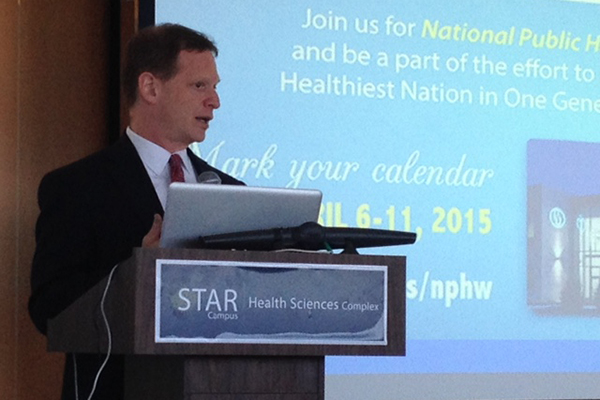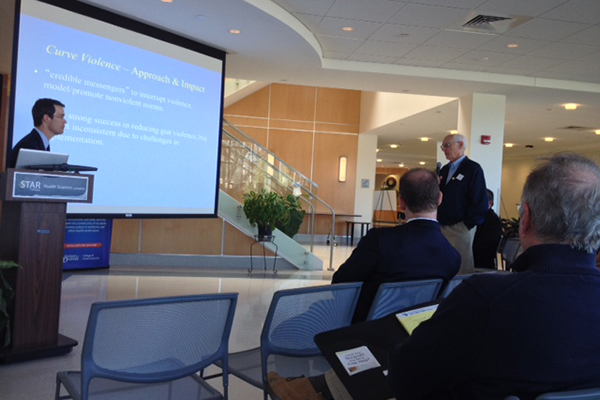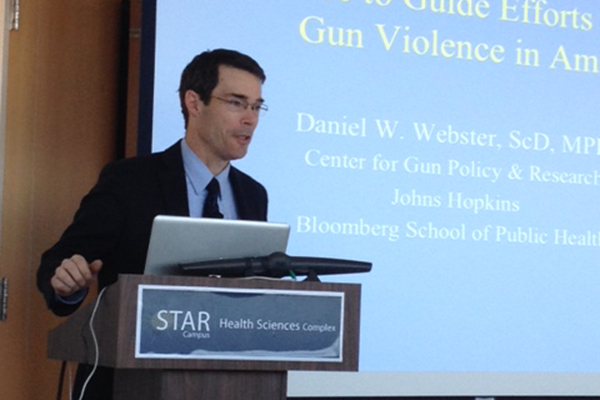


Gun violence in America
State attorney general, Johns Hopkins expert address need for tighter controls
3:44 p.m., April 7, 2015--Matt Denn has been Attorney General of Delaware for just three months but he has already spent too much time talking to people who have suffered “unimaginable loss” — parents who have lost their children to gun violence.
“When we get into debates about gun violence, people fall into familiar roles and end up talking past each other,” Denn said in his welcome remarks at the University of Delaware’s celebration of National Public Health Week. “It’s a shame because to a degree they’re all right.
Campus Stories
From graduates, faculty
Doctoral hooding
Denn said the community needs stricter regulation of the purchase and use of guns, tougher enforcement of existing laws, and consideration of the social issues that often lead to gun violence.
One of Delaware’s current initiatives in fighting gun violence focuses on changing how juveniles are handled in the system. Currently, their records are cleared when they turn 18.
“We have to change the narrative,” Denn said. “We have to tell teens that if they carry guns, there will be serious consequences. This is a population we’re very concerned about and a loophole that we have to close.”
Following his brief remarks, Denn introduced guest speaker Daniel Webster, director of the Johns Hopkins Center for Gun Policy and Research, whose research addresses gun violence as a leading cause of death and a major cause of racial disparities in premature mortality among men.
Webster’s talk, “Evidence to Guide Efforts to Reduce Gun Violence in America,” attracted more than 150 attendees to the Health Sciences Complex Atrium on UD’s Science, Technology and Advanced Research (STAR) Campus.
The cost of gun violence
In 2013, the U.S. experienced more than 33,000 shooting deaths, of which about two-thirds were suicides and one-third homicides. An additional 62,000 people suffered serious injuries from gunshots during that period.
Gunshot wounds are the leading cause of death for males ages 15 to 24, and 18- to 20-year-olds can acquire firearms in all but 12 states.
“In most states, you can get a handgun before you can get a beer,” Webster said.
He pointed out that the impact of gun violence goes far beyond deaths and injuries to include psychological trauma, reduced outdoor exercise, and economic costs from lost business, due to the ever-present fear experienced by people living in areas plagued by violence.
“Despite the notion that guns make us a freer nation, for many people the opposite is actually true,” Webster said.
Reducing the risk
According to Webster, one of the most effective approaches to reducing gun violence is keeping guns out of the hands of dangerous people through laws that require reporting of lost and stolen firearms. In 2013, Delaware passed a law requiring owners to report, within one week, the loss or theft of a handgun. First and second offenses carry fines, while a third offense is a class G felony.
“We have to establish higher standards for gun ownership and carrying and increase accountability of both gun sellers and buyers,” Webster said. “Data show that firearm prohibitions for high-risk groups do reduce violence.”
He also emphasized that the public health and criminal justice systems have to work in tandem to reduce gun violence.
“Public health can often access critical situations with more trust than the police, but we need the criminal justice system to enforce the law,” he said. “We’re starting to see better collaboration between the two.”
Homicide in the headlines
Solutions can’t come quickly enough.
Record shootings and homicides in recent years helped make Wilmington, Delaware, the sixth most violent city in America among 750 cities with 50,000 or more residents.
According to a recent article in the Wilmington News-Journal, the city currently has 77 unsolved homicides, and, as of Friday, April 4, eight people had been killed and 22 wounded by gunfire, a pace that would “exceed last year’s carnage.”
But by Monday afternoon, when Denn and Webster were speaking, those statistics were already outdated.
Over the weekend, a 19-year-old male was found with multiple gunshots and later pronounced dead at Christiana Hospital. An 18-year-old female was listed in stable condition with a single gunshot wound in the foot.
And on Monday night, another man was shot and critically wounded in the city.
The carnage continues.
Article by Diane Kukich










